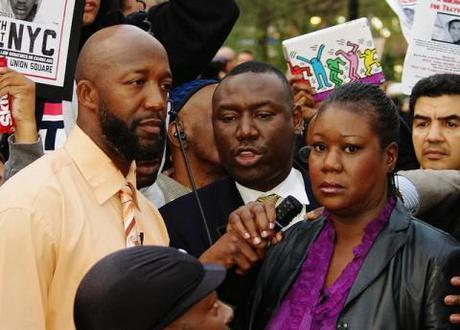
Trayvon Martin's parents at New York protest rally. Photo credit: David Shankbone via flickr
The killing of Trayvon Martin continues to dominate US hearts and headlines. Thousands of demonstrators marched through Sanford, Florida on Saturday, in protest against the fact that neighbourhood watch volunteer George Zimmerman remains free despite shooting the unarmed black teenager.
A leaked police report appeared to support Zimmerman’s version of events, in which he claimed he had acted in self-defence after being attacked by Martin. But recent reports have cast doubt on his story, with CCTV apparently showing Zimmerman with no visible injuries soon after the shooting. And according to The Orlando Sentinel, a voice analysis expert has determined that the person heard calling for help before the fatal shot was fired on a 911 recording is not, as was claimed, Zimmerman.
The case has put the subject of racial equality in the US into the spotlight, as controversy rages over whether the death of Martin is indicative of a serious nationwide divide. Commentators have pointed to a ‘racist smear campaign’ in certain sections of the media, after stories emerged picking over the teenager’s background.
Racial profiling. “In the US, racial profiling – where black people are judged negatively, purely on account of our skin color – is everywhere,” wrote civil rights campaigner Jesse Jackson on The Guardian’s Comment is Free – and this is what led to the death of Trayvon Martin. Jackson argued that the focus should not simply be on getting Zimmerman convicted but on the wider picture: “We need a revival of the civil rights commission at the federal level. We need to pass new laws to combat racial profiling at the federal, state and local levels.”
The case also raises questions over racial terms used by the media, wrote Ruben Navarrette Jr at CNN, criticising distinctions being made about George Zimmerman’s race: “Rather than just refer to Zimmerman as Hispanic and be done with it, [the media] created the hybrid term white Hispanic… Are we now going to refer to people as white Hispanics and black Hispanics? Given that my complexion is a shade lighter than brown, should I be referred to as beige Hispanic? Where does this end?”
Black masculinity trap. “It is sad how this country continues to sweat black men. Their physicality, sexuality, language, labor, creativity, survival skills and behavior are always under scrutiny,” wrote Akiba Solomon at Colorlines. Solomon used the example of his cousin, a person of “sweetness and profound weirdness” who nevertheless, because he is “black and big” is under threat from “fatally anxious, white-identified men brandishing unsorted feelings and 9-millimeter pistols”: “That’s how men like my cousin get trapped in limbo—unable to get the fringe benefits of prescribed black masculinity but still carrying the tangible risks of it,” Solomon wrote.
The shooting of Trayvon Martin is the US public’s top news story, according to the Pew Research Center, but there is a racial divide: “African Americans are more than twice as likely as whites to say that this was their top story (52% vs. 20%).”
Racial ‘weapon bias’. Timothy Noah reported for The New Republic that a 2006 study found that racial profiling plays a part in whether people can identify whether or not someone is carrying a weapon. “In the study, subjects were asked to distinguish between images of harmless hand tools and images of guns, both projected onto a screen. Immediately before each image appeared there flashed a lightening-quick (more or less subliminal) image of a white face or a black face,” Noah wrote. The study found participants were quicker to identify a weapon after seeing a black face, and that there were more false positives than after a white face was flashed. This, said Noah, shows how “catastrophic” Florida’s ‘stand your ground’ self-defence law really is: “If people are more likely to imagine guns in the hands of black people than white people then the result will be disproportionate deaths for innocent black people.”
See President Barack Obama’s statement on the Trayvon Martin case below.
Why Trayvon Martin? “If Martin were white, or any other race, would the president of the United States have called for soul searching’?” asked Cal Thomas at The South Florida Sun-Sentinel. “The facts in this case are not yet fully known, but that doesn’t stop people from thinking they have them, giving some an excuse to resurrect racial templates from the past.” Thomas suggested that the US media is at least partly to blame for encouraging racial stereotypes: “The steady drumbeat of crime and violence in the media and their association of race and crime with certain parts of town feed into the often irrational fears of white people.”

